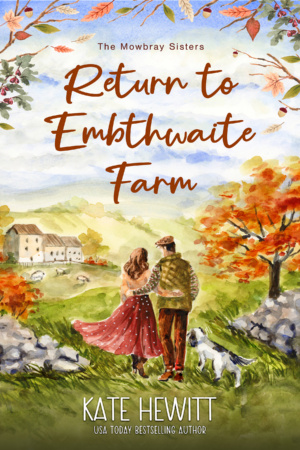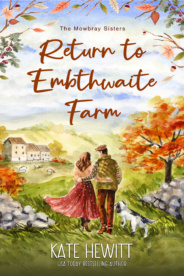Start reading this book:

Share This Excerpt
Chapter One
The unknown number making her mobile buzz insistently had the area code from home. Rachel Mowbray squinted in the hard glare of the bright Ibiza sunlight as she glanced down at the unfamiliar number and wondered whether she should answer it. Did she really want to hear from anyone in the 01653 dialling code? The truth was, not particularly.
She switched her phone to silent and slipped it into the oversize straw bag leaning against her sun lounger. This was the first proper holiday she’d had in several years, and it was only her second day of it. The knots between her shoulders had yet to loosen, and last night she’d been too exhausted to hang out by the beach bar as she’d intended and so she’d gone to bed at ten-thirty after a single mojito. Hardly the knees-up, hair-down scenario she’d been hoping for herself, but that would come in time. She had five more days here in the sun, after all.
In her bag her phone buzzed again, quietly, like a trapped wasp. Rachel closed her eyes and leaned her head back against the plastic slats of her lounger. The sunlight shimmered on her closed lids, and she could hear the gentle lapping of the sea, the distant laughter of some children playing on the beach…and the buzz of her phone.
For heaven’s sake.
She took a deep breath and opened her eyes, the dazzle of the sun on the water blinding her for a second. Her phone was still ringing. Whoever was trying to call her was being annoyingly persistent. A flicker of worry licked at her insides, and she immediately squashed it. If it was anything important, she would recognise the number, and really, the only person who would be calling her from Yorkshire was her sister Harriet, and they hadn’t spoken in months, maybe years. It was probably just the library chasing up a book she’d taken out twenty years ago, or maybe the local surgery reminding her she was due for a cervical smear. She might not have lived in Mathering, North Yorkshire, for over a decade, but locals liked to forget that. Just as an outsider could never be fully accepted into their exalted ranks, an insider could never leave. Not truly. Not even if you did your best never to go back.
Her phone thankfully, finally, fell silent. Rachel let out her breath in a gust and leaned once more against her lounger. Time, at last, to relax…
Buzz. Buzz. Buzz.
“Damn it!” The words exploded out of her, earning her a censorious look from a woman on the lounger a few metres away, who had a toddler by her feet, building a sandcastle with a bucket and spade. The little girl looked up at her, wide blue eyes blinking slowly.
Rachel spared the mother a fleeting, only semi-apologetic glance before she snatched up her phone. “Yes?” she demanded, not able or even willing to hide her surly impatience.
“Hello, Rachel.”
The voice, low and smooth and assured, with a generous hint of Yorkshire accent, had the same effect as a fist slamming into her solar plexus. For a second Rachel was breathless, blinking in the bright sunlight, her mind spinning uselessly as she did her utmost to keep any memories at bay.
“Are you there?” Ben Mackey asked.
Her breath came out in something alarmingly like a gasp before she said shortly, “Yes. Obviously. Why are you ringing me?” How did you get my number, was what she really wanted to ask. She hadn’t talked to Ben Mackey, not properly anyway, in twelve years. And not at all in at least about five. The last time she’d been home she’d seen him on a tractor in the distance, his stony gaze moving right over her as if she were invisible. Well, so what? It wasn’t like they were friends. Not anymore.
“I’m ringing,” Ben told her in that slow, careful drawl he had, like he was never going to rush about anything, “about your dad.”
“My dad—” Rachel heard the panic in her voice and strove to moderate it. If it was something serious, Harriet would have called, she reminded herself. She would have called about six times.
“He’s all right,” Ben said in that same slow way, “but you need to come home.”
“What? Why?” She couldn’t get her head around what he seemed to be implying. “What do you mean? What’s going on?”
“I can’t go into it on the phone,” Ben said. “At least, I shouldn’t. Harriet can tell you more. But you need to come home.”
There was an implacable note in his voice that Rachel instinctively bristled against, even as she felt a deep, sudden shaft of fear slice right through her. Who was her neighbour, whom she hadn’t talked to in donkey’s years, to tell her what to do about her own father? If he’d ever had that kind of prerogative, he’d lost it a long time ago. “Well,” she said, unable to keep from sounding just that little bit snarky, “that’s a little difficult because I’m on holiday right now, in Ibiza.”
A short silence greeted this pronouncement before Ben remarked neutrally, far too neutrally, “Ibiza, eh?”
So what? Rachel wanted to snap. I’m allowed to go to Ibiza. I’m allowed a holiday, the first one I’ve taken in years, as well as a life away from the farm and all that it is. I am! Of course, no one back home was likely to agree with that, even as they’d tell her that of course she was. Rachel still felt their judgement, had felt it for twelve years, since she’d taken up her place at the University of Exeter, which was about as far as she’d been able to get away from the North Yorkshire Moors without actually leaving the country.
“Well,” Ben continued when Rachel had not said anything because her jaw was clenched too tight, “can you get an earlier flight home?”
“Is it that serious?” She heard the thin needling of fear prick holes in her snarky tone. “Why can’t you tell me what’s going on?”
“It’s important, Rachel.”
Ben’s voice was gentle, and Rachel’s stomach dipped unpleasantly. “Is my dad ill?” she asked abruptly, and she was greeted with another one of Ben’s meaningful silences. The things the man didn’t say outweighed, by far, the things that he did. He’d always been that way, so had his father, and her own, for that matter. Yorkshire farmers were sparing with their words—and their feelings.
“He needs to go in for some tests,” Ben said at last. “Not that he’d admit it. But he’s been forgetting some things. It’s starting to worry us.”
Us. The word was like a hedge surrounding him, Harriet, everyone Rachel had left behind. Us definitely did not include her. Everyone back home had always made that abundantly clear. “All right.” She breathed out evenly, focused on keeping calm. Controlled. It was a strategy that worked in her high-stress job in finance, and it would work with this—even if the memories were already rising in a dark tide.
You want to go? Fine. Go. Like I care. Don’t bother coming back.
And as for Ben, back then? Ringing silence. He hadn’t said a single word. She’d stood in the Mackeys’ barn while he’d mucked out a stable and waited for him to say something. Anything. He hadn’t even turned around.
Okay, breathe. In. Out. Rachel opened her eyes, having not realised she’d closed them until she was met with the sun’s glare once again. “So he needs some tests,” she stated, knowing the silence had gone on too long, but relieved to hear how calm she sounded. “Why do I need to rush home for that?”
“Because he’s refusing to go in for them,” Ben replied. “He’s got an appointment at a memory clinic the day after tomorrow and Harriet can’t convince him to go.”
Of course not. Her sister Harriet’s strong suit was not convincing anyone of anything. Or doing anything remotely proactive. She was more in the huffing and hand-wringing line. “And you think I can?” Rachel asked, trying to scoff.
“You know you can.” Ben did not make it sound like a compliment.
Rachel stared out at the aquamarine sea, shining like a jewel, the white sand beach stretching out, so soft and inviting. She’d barely unpacked her suitcase; she hadn’t even tried on her new bikini yet. She’d signed up for a Zumba class that afternoon. She wanted another mojito.
“You owe this to Harriet,” Ben said quietly, and Rachel’s fingers clenched so hard on her phone that her knuckles ached.
“I don’t actually owe anyone anything,” she replied curtly, “as it happens.” Ben let out a small sigh that communicated as clearly as if he’d said that he expected no less of her, to say something like that, because his expectations of her were so very, very low. “I really don’t,” Rachel insisted, even though, with a weary resignation, she already knew she was going to go. It felt inevitable, like an undertow she was slowly, inexorably being pulled into, or maybe like quicksand. Sucked down, down, down, into the depths, and there was absolutely nothing she could do about it. This was her family, and even if she’d been avoiding them for ten years—and they’d been avoiding her, in their own way—she was still going to go home when she was asked to.
And Ben must have known that, as well, because he asked calmly, “When can we expect you?”
“I’ll get a flight tonight,” Rachel snapped, “and drive up tomorrow.” And then she disconnected the call, because she could not bear to hear the smugness in his voice when he told her, so patronisingly and yet still managing to seem so unimpressed, that she was doing the right thing.
With a growl of frustration Rachel hurled her phone into her bag, earning yet another reproving look from the toddler’s mum.
It was raining in Yorkshire. It was always raining in Yorkshire, Rachel thought with a sigh, as she drove her rental car up the A1(M). With a reluctant sigh, she acknowledged that this sentiment was at least a little bit unfair; for the very few days a year when it wasn’t raining up here, it was utterly beautiful. And as if God Himself were trying to score a point just then, the dank grey clouds cleared away as she turned off the motorway for the A-road that led to Mathering, the market town on whose outskirts she’d spent the first eighteen years of her life. The sky turned a fragile, ethereal blue and sunlight poured over the rolling moors, touched with the first autumn colour, like liquid gold. Stone barns and farmhouses peeked out from where they were nestled in gentle valleys, their windows glinting diamond-bright in the sunshine. A few sheep, cows, and horses dotted various slopes and fields like they’d been placed there as props; the whole thing was absurdly and perfectly pastoral, a postcard brought to life, an oil painting turned to reality. Yorkshire was called God’s Own Country, and you could see why on a day like this. Never mind that for Rachel going home felt far more like going to hell.
All right, that was a bit extreme, she told herself, determined to get out of her funk, at least a little. She still smelled of sun cream and she’d had a morose mojito in the airport back in Ibiza, her holiday fast-tracked to forty-eight hours. Going home wasn’t like going to hell, but it definitely had some purgatory-like vibes. Walking down the high street felt like going back in a time machine. Stepping into her family’s farmhouse felt like becoming a child again, with all its ensuing, unhappy memories, not to mention the chilly silence from her sister, the utter indifference from her father. Was it any wonder she’d wanted to leave?
She followed the road up hill and down, past sleepy farms and cheerful bed and breakfasts; the area near the motorway was semi-gentrified, thanks to tourism’s benevolent effect, with one farm offering glamping yurts, another an organic farm shop. It was another thirty-five minutes to Mathering, which tourism had not touched with quite the same generous hand.
At least it hadn’t the last time Rachel had, reluctantly, been there, for her father’s seventieth birthday. There had been no notable celebrations, but Harriet had acted as if she’d be the most heartless daughter alive if she didn’t come home for the big day. And, Rachel knew, she’d semi-hoped her father would have been happy to have her there. She had, unsurprisingly, been disappointed on both counts. No matter what she did—or didn’t do—it was never enough for Harriet, and her dad never even seemed to notice.
And so, three years ago, she’d driven back to London determined not to bother again, or at least for a very long while. Why torture herself? It wasn’t as if Harriet or her dad enjoyed her company, either, so why torture them, for that matter?
So why was she here for yet more punishment for all three of them? Oh, right. Tests. A memory clinic. Rachel had spent several hours on her laptop last night researching memory clinics and the seemingly inevitable dementia diagnoses going to one indicated. Back in her tiny flat in Putney she’d printed out several relevant documents, an array of literature to give to her sister to equip her for dealing with their dad, if that’s what it came to. And if it did, she supposed she’d have to make the drive from London to Mathering as often as she could, to help out. The thought made everything in her clench and cringe. Harriet would not appreciate her help—that much she knew—even as she would be sulky that Rachel wasn’t doing more. It had been a lose-lose proposition for Rachel for a long time.
But maybe, she told herself, this was all the typical tempest in a teapot. Maybe their dad was becoming a little absent-minded; he was seventy-three, after all. It didn’t mean he had Alzheimer’s, for heaven’s sake, but that’s where Harriet’s mind would have immediately gone, even if she hadn’t bothered to mention any of it to Rachel. Why had Ben, of all people, called her? Had Harriet asked him to?
For a second she let herself picture Ben—his weathered face, shock of brown hair that stood up at all angles, eyes the colour of acorns, a glinting golden-brown. That slow, lazy smile. That broad chest.
She decided to stop that train of thought. She and Ben might have shared a couple of kisses in their teens—or something like that—but those days were long, long gone.
Anyway, Rachel told herself, this might be an easy fix. She could hope, anyway. She was giving it three days, which was the rest of her holiday time, plus a day to get back to London. After that, well, she supposed they would have to see, but she wasn’t going to let Harriet guilt her into staying any longer than that, because her sister thought she owed her.
Even if she did.
Embthwaite Farm looked exactly the same as it always did, which was both comforting and depressing. Same Georgian-era square, squat farmhouse of grey Yorkshire stone, same dusty curtains at the living room windows, the best room of the house and hardly ever used, except for when her father read the newspaper after tea, as regular as clockwork.
A wisp of smoke curled up from the chimney into the pale blue sky, and sunlight glinted on the rain puddles in the farmyard. It would have been a lovely sight, if it hadn’t been home.
Rachel pulled her car into the drive, wincing as the wheels hit the deep ruts. She turned the car off and sat there for a few seconds, her hands resting on the steering wheel, trying to steel herself for whatever lay ahead. She could pretty much predict it, unfortunately—Harriet’s bristling hostility and covert-yet-constant suspicious looks; her father’s continued silent, brutal indifference. Her self-confidence took a battering every time she stepped across the threshold, even if she did her best not to show as much, not to be the girl she’d been here growing up—frightened, angry, hiding her hurt, trying to protect the sister who now couldn’t stand her.
She let out a gust of breath and then squared her shoulders and got out of the car. She took her one small suitcase out of the back, along with her work bag, and then headed for the front door.
It creaked as she opened it and the smell of home hit her, with all its accompanying memories—must, dust, dog, woodsmoke, a hint of cooking grease and coffee. The dog in question heaved his arthritic form from his usual place in the hall, by the welly boot rack, and came trotting faithfully towards her, lying down at her feet, his plumed tail beating a determined staccato on the floor as he looked up at her with cataract-clouded eyes.
Quite suddenly, tears stung Rachel’s eyes and she blinked them back, crouching down to stroke the dog’s silky brown ears. “Hey there, Fred.” He had to be thirteen years old now, she realised. Ben had given him to her from his own spaniel’s litter, back when they’d been friendly. He’d asked what she was going to call him, and she’d said she didn’t like all those cutesy dog names—Fido, Lucky, Spark. “I’m going to call him Fred,” she’d declared, and Ben had let out a sudden huff of laughter. The man rarely cracked so much as a smile, but when he laughed, even in a small way, it was a sound of genuine joy.
Rachel gave Fred one more pat on the head before she rose, bracing herself for whatever lay ahead. No one, of course, had come out to greet her. Fred trotted back to his spot and flung himself down on the bit of battered old carpet that served as his dog bed. The last time she’d been here, Rachel had bought a top-of-the-line dog bed, leather lined in fleece, thinking Fred deserved it for his old bones, but he’d turned up his nose at it, just as Harriet had.
Even the dog beds you buy are fancy.
In Yorkshire, that was definitely not a compliment.
Slowly Rachel walked down the hall, the floor’s flagstones worn down in some places to match the tread of farmers’ footsteps through the centuries. The house was two hundred years old, bought by her great-great-great-great-grandfather after he’d worked as manager for the big manor house on the other side of Mathering. It had been a proud day when the Mowbrays had become landowners, her father had liked to say, as if he’d been alive in 1819, or whenever Albert Mowbray had taken up residence here. There was a needlepoint sampler hanging over the hall table that had been made by his wife, Jane—the alphabet laid out in neat stitches, with a Bible verse beneath: In His hands are the deep places of the earth; the strength of the hills is His also. Psalm 95, verse four. Rachel had read it every time she’d put on her shoes.
She continued past it to the doorway at the back of the hall that led to the kitchen, the true heart of the house, if this house even had a heart. There had been times when Rachel had wondered.
The room, large and square, was empty now, and the same as it ever was. The ancient, rattling Rayburn taking up one wall, the deep farmhouse sink and the countertop another, a Welsh dresser on the third, filled with dusty bits of china no one ever used. A big rectangular table of scarred oak in the middle, where she’d eaten every meal as a child. A memory came, sudden and sharp, of her mother flinging a pan of toad-in-the-hole onto the centre of the table, where it had clanged and bounced, both Rachel and Harriet drawing away in fearful surprise.
“I can’t do this anymore,” her mother had said, bent over the kitchen sink, her head in her hands, her body shaking with sobs. The emotion Rachel remembered feeling the most had been annoyance, underlaid by a terrible fear she hadn’t wanted to acknowledge. Mums aren’t meant to do that, she recalled thinking, and it had felt like the world had tilted on its axis, because you were meant to rely on your mum, but she knew in that moment that she hadn’t been.
She hadn’t said anything, though. She’d just taken the oven mitt her mother had hurled onto the floor and righted their supper. Then she’d cut large slices of toad-in-the-hole and put them on her and Harriet’s plates. While she’d begun to eat in silent defiance, Harriet had run to their mother and wrapped her arms around her waist.
“Don’t cry, Mummy, don’t cry,” she’d pleaded.
While their mother had put her arms around her youngest daughter, Rachel had stolidly eaten her way through a large helping of toad-in-the-hole, and then taken a second, simply to make a point, although in retrospect she wasn’t even sure what that point had been. She didn’t think her mother had even noticed, anyway.
Letting out a weary sigh, she leaned over the table to inspect it; yes, the scorch mark from that sorry episode was still there, faded but visible. How old had she been then? Ten, maybe? It had been another seven years before her mother had finally left, but in retrospect Rachel had realised she’d been working up to it the whole time.
She straightened just as the back door opened and Harriet came clomping in, wearing a pair of muddy boots and holding a basket of eggs. Her eyes widened in surprise for a second; Rachel realised she hadn’t actually told her sister she was coming, so taken up had she been with her dad’s potential illness. She supposed she’d assumed Ben would have, but he clearly hadn’t.
“Hi, Harriet—” she began, only to have her sister cut across her flatly.
“So, you’re back.” She deposited the basket of eggs on the counter next to the sink, not looking at her. The tentative smile that had been curling the edges of Rachel’s mouth flickered and died like old ash.
“Yes,” she agreed, just as flatly. “I’m back.”
End of Excerpt










